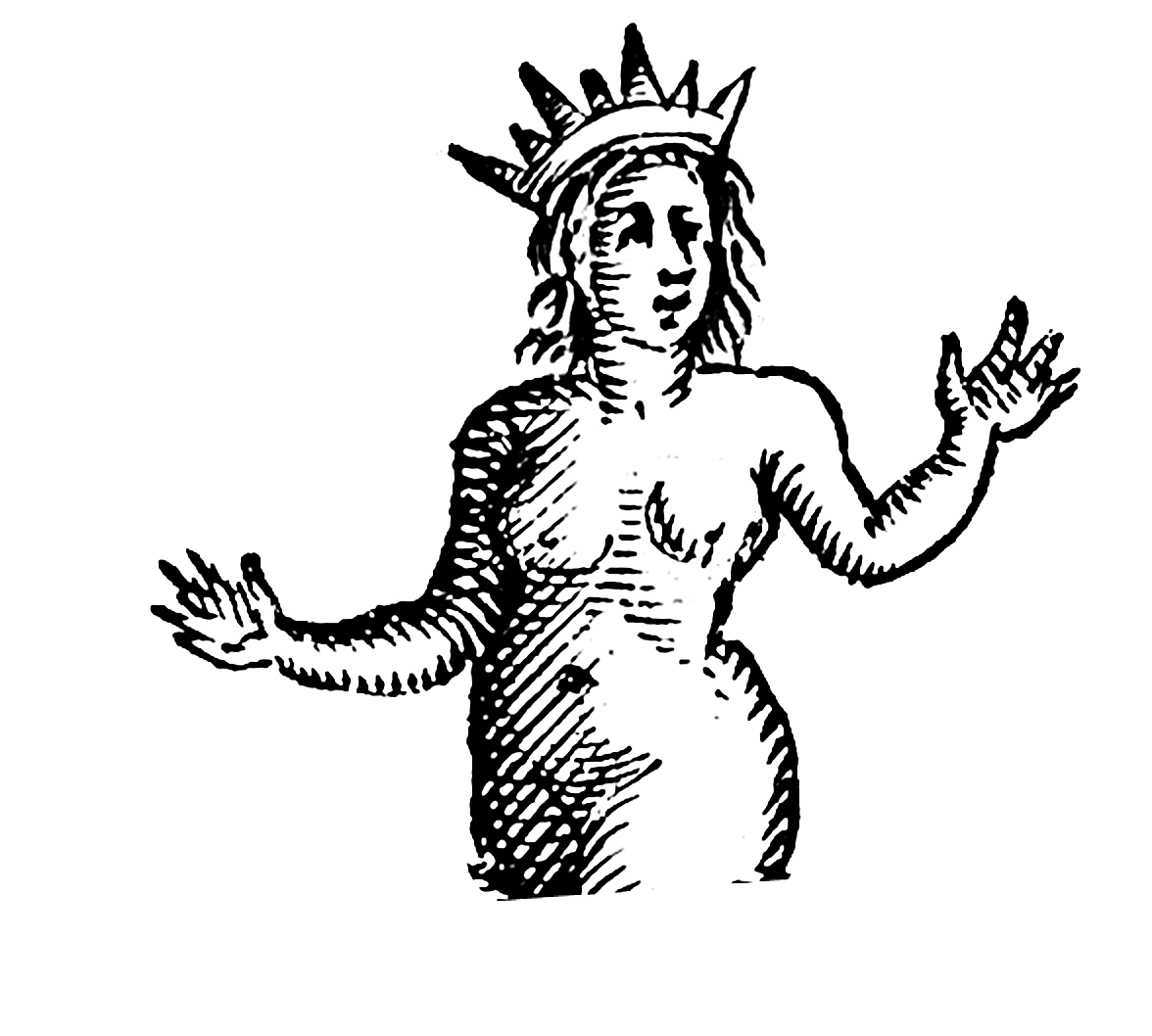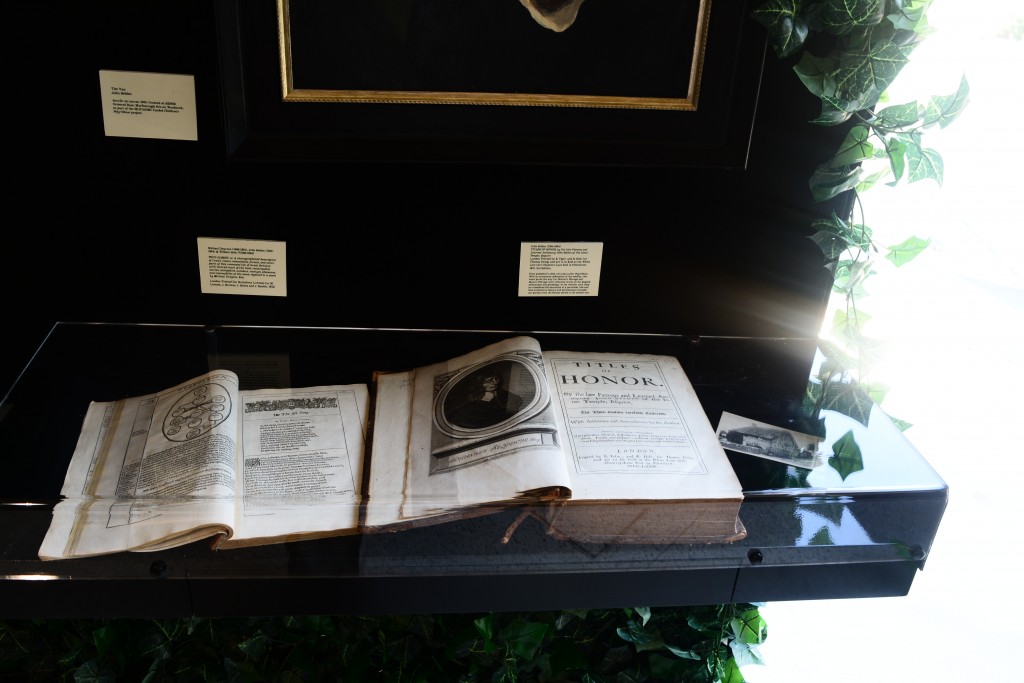- Royal Geographical Society installation
Full Text
For the full text of Poly-Olbion, click here to access the University of Exeter online, unannotated edition.
Extracts
The following excerpts represent a sampling of the rich content and wide subject matter of the poem.
THE ANCIENT FORREST OF ARDEN SPEAKS
FROM THE THIRTEENTH SONG
My many goodly sites when first I came to showe,
Here opened I the way to myne owne ouer-throwe:
For, when the world found out the fitnesse of my soyle,
The gripple wretch began immediatly to spoyle
My tall and goodly woods, and did my grounds inclose:
By which, in little time my bounds I came to lose.
When Britaine first her fields with Villages had fild,
Her people wexing still, and wanting where to build,
They oft dislodg’d the Hart, and set their houses, where
He in the Broome and Brakes had long time made his leyre.
Of all the Forrests heere within this mightie Ile,
If those old Britains then me Soueraigne did instile,
I needs must be the great’st; for greatnesse tis alone
That giues our kind the place: else were there many a one
For pleasantnes of shade that farre doth mee excell.
But, of our Forrests kind the quality to tell,
VVe equally partake with Wood-land as with Plaine,
Alike with Hill and Dale; and euery day maintaine
The sundry kinds of beasts vpon our copious wast’s,
That men for profit breed, as well as those of chase▪
Here Arden of her selfe ceast any more to showe;
And with her Sylvan ioyes the Muse along doth goe.
When Phoebus lifts his head out of the Winters waue,
No sooner doth the Earth her flowerie bosome braue,
At such time as the Yeere brings on the pleasant Spring,
But Hunts-vp to the Morne the feath’red Sylvans sing:
And in the lower Groue, as on the rising Knole,
Vpon the highest spray of euery mounting pole,
Those Quirristers are pearcht with many a speckled breast.
Then from her burnisht gate the goodly glittring East
Guilds euery lofty top, which late the humorous Night
Bespangled had with pearle, to please the Mornings sight:
On which the mirthfull Quires, with their cleere open throats,
Vnto the ioyfull Morne so straine their warbling notes,
That Hills and Valleys ring, and euen the ecchoing Ayre
Seemes all compos’d of sounds, about them euery where.
The Throstell, with shrill Sharps; as purposely he song
T’awake the lustlesse Sunne; or chyding, that so long
He was in comming forth, that should the thickets thrill:
The Woosell neere at hand, that hath a golden bill;
As Nature him had markt of purpose, t’let vs see
That from all other Birds his tunes should different bee:
For, with their vocall sounds, they sing to pleasant May;
Vpon his d dulcet pype the Merle doth onely play.
When in the lower Brake, the Nightingale hard-by,
In such lamenting straines the ioyfull howres doth ply,
As though the other Birds shee to her tunes would draw.
And, but that Nature (by her all-constraining law)
Each Bird to her owne kind this season doth invite,
They else, alone to heare that Charmer of the Night
(The more to vse their eares) their voyces sure would spare,
That moduleth her tunes so admirably rare,
As man to set in Parts, at first had learn’d of her.
To Philomell the next, the Linet we prefer;
And by that warbling bird, the Wood-Larke place we then,
The Red-sparrow, the Nope, the Red-breast, and the Wren,
The Yellow-pate: which though shee hurt the blooming tree,
Yet scarce hath any bird a finer pype then shee.
And of these chaunting Fowles, the Goldfinch not behind,
That hath so many sorts descending from her kind.
The Tydie for her notes as delicate as they,
The laughing Hecco, then the counterfetting lay,
The Softer, with the (Shrill some hid among the leaues,
Some in the taller trees, some in the lower greaues)
Thus sing away the Morne, vntill the mounting Sunne,
Through thick exhaled fogs, his golden head hath runne,
And through the twisted tops of our close Couert creeps
To kisse the gentle Shade, this while that sweetly sleeps.
 THE HERMIT OF ARDEN’S HERBS
THE HERMIT OF ARDEN’S HERBS
FROM THE THIRTEENTH SONG
His happy time he spends the works of God to see,
In those so sundry hearbs which there in plenty growe:
VVhose sundry strange effects he onely seeks to knowe.
And in a little Maund, beeing made of Oziars small,
VVhich serueth him to doe full many a thing withall,
He very choicely sorts his Simples got abroad.
Heere finds he on an Oake Rheume-purging Polipode;
And in some open place that to the Sunne doth lye,
He Fumitorie gets, and Eye-bright for the eye:
The Yarrow, where-with-all he stops the wound-made gore:
The healing Tutsan then, and Plantan for a sore.
And hard by them againe he holy Vervaine finds,
Which he about his head that hath the Megrim binds.
The wonder-working Dill hee gets not farre from these,
Which curious women vse in many a nice disease.
For them that are with Newts, or Snakes, or Adders stong,
He seeketh out an hearbe that’s called Adders-tong;
As Nature it ordain’d, its owne like hurt to cure,
And sportiue did her selfe to niceties invre.
Valerian then he crops, and purposely doth stampe,
T’apply vnto the place that’s haled with the Crampe.
As Century, to close the wideness of a wound:
The belly hurt by birth, by Mugwort to make sound.
His Chickweed cures the heat that in the face doth rise.
For Physick, some againe he inwardly applyes.
For comforting the Spleene and Liuer, gets for iuce,
Pale Hore-hound, which he holds of most especiall vse.
So Saxifrage is good, and Harts-tongue for the Stone,
With Agrimony, and that hearbe we call S. Iohn.
To him that hath a flux, of Sheepheards purse he giues,
And Mous-eare vnto him whom some sharpe rupture grieues.
And for the laboring wretch that’s troubled with a cough,
Or stopping of the breath, by fleagme that’s hard and tough,
Campana heere he crops, approoued wondrous good:
As Comfrey vnto him that’s brused, spetting blood;
And from the Falling-ill, by Fiue-leafe doth restore,
And Melancholy cures by soueraigne Hellebore.
Of these most helpfull hearbs yet tell we but a few,
To those unnumbred sorts of Simples here that grew.
*Which iustly to set downe, euen Dodon short doth fall;
Nor skilfull Gerard, yet, shall euer find them all.
 ENGLISH VEGETABLES
ENGLISH VEGETABLES
FROM THE TWENTIETH SONG
The Colewort, Colifloure, and Cabidge in their season,
The Rouncefall, great Beanes, and early ripening Peason;
The Onion, Scallion, Leeke, which Housewives highly rate;
Their kinsman Garlicke then, the poore mans Mithridate;
The savory Parsnip next, and Carret pleasing food;
The Skirret (which some say) in Sallats stirres the blood;
The Turnip, tasting well to Clownes in Winter weather.
Thus in our verse we put, Roots, Hearbs, and Fruits together.
The great moyst Pumpion then, that on the ground doth lie,
A purer of his kind, the sweet Muske-million by;
Which dainty pallats now, because they would not want,
Have kindly learnt to set, as yearely to transplant:
The Radish somewhat hote, yet urine doth prouoke;
The Cucumber as cold, the heating Artichoke;
The Citrons, which our soyle not easly doth affourd;
The Rampion rare as that, the hardly gotten Gourd.
NOTES
COLEWORT: a general name for any plant of the cabbage kind, genus Brassica
ROUNCEFALL: a large variety of garden or field pea.
MITHRIDATE: a medicinal preparation, usually with many ingredients, believed to be a
universal antidote to poison or a panacea.
SKIRRET: Sium sisarum, a species of water parsnip, formerly much cultivated in Europe
for its esculent tubers.
MUSKE-MILLION: The edible fruit of the melon (Cucumis melo subsp. melo)
RAMPION: the edible white root of the bellflower Campanula rapunculus.
 NORTH SEA FISH
NORTH SEA FISH
FROM THE FIVE AND TWENTIETH SONG
For that of all the Seas inuironing this Isle,
Our Irish, Spanish, French, how e’r we them enstyle,
The German is the great’st, and it is onely I,
That doe vpon the same with most aduantage lye.
What Fish can any shore, or British Sea-towne show,
That’s eatable to vs, that it doth not bestow
Abundantly thereon? the Herring king of Sea,
The faster feeding Cod, the Mackrell brought by May,
The daintie Sole, and Plaice, the Dabb, as of their blood;
The Conger finely sous’d, hote Summers coolest food;
The Whiting knowne to all, a generall wholesome Dish;
The Gurnet, Rochet, Mayd, and Mullet, dainty Fish;
The Haddock, Turbet, Bert, Fish nourishing and strong;
The Thornback, and the Scate, prouocatiue among:
The Weaver, which although his prickles venom bee,
By Fishers cut away, which Buyers seldome see:
Yet for the Fish he beares, tis not accounted bad;
The Sea-Flounder is here as common as the Shad;
The Sturgeon cut to Keggs, (too big to handle whole)
Giues many a dainty bit out of his lusty Iole.
Yet of rich Neptunes store, whilst thus I Idely chat,
Thinke not that all betwixt the Wherpoole, and the Sprat,
I goe about to name, that were to take in hand,
The Atomy to tell, or to cast up the sand;
But on the English coast, those most that usuall are,
Wherewith the staules from thence doe furnish us for farre;
Amongst whose sundry sorts, since thus farre I am in,
Ile of our Shell-Fish speake, with these of Scale and Fin:
The Sperme-increasing Crab, much Cooking that doth aske,
The big-legg’d Lobster, fit for wanton Venus taske,
Voluptuaries oft take rather then for food,
And that the same effect which worketh in the blood
The rough long Oyster is, much like the Lobster limb’d:
The Oyster hote as they, the Mussle often trimd
With Orient Pearle within, as thereby nature show’d,
That she some secret good had on that Shell bestow’d:
The Scallop cordiall iudgd, the dainty Wilk and Limp,
The Periwincle, Prawne, the Cockle, and the Shrimpe,
For wanton womens tasts or for weake stomacks bought.

